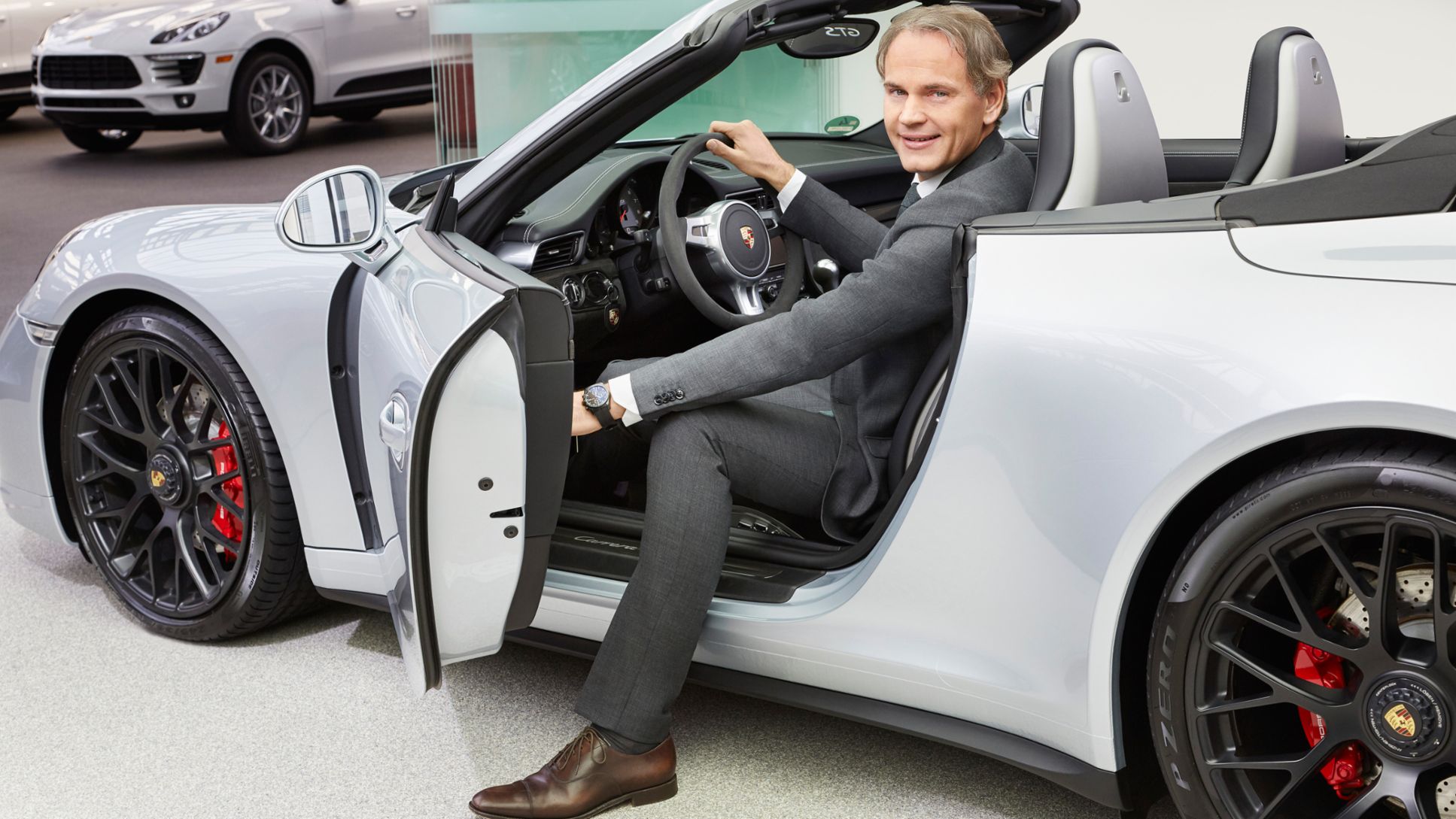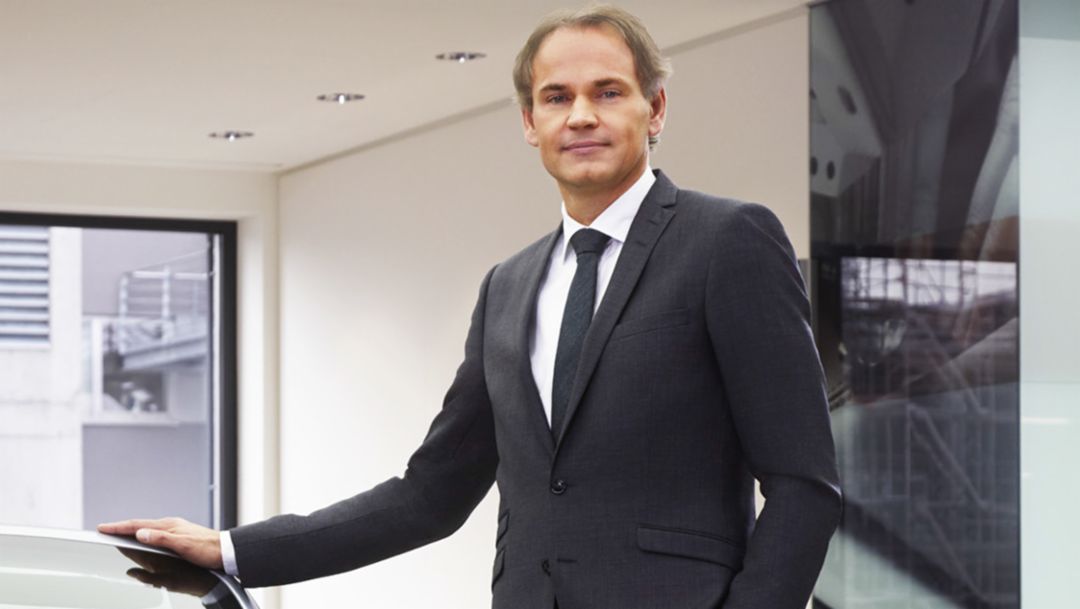The Porsche 911 exists for half a century already and is one of the world’s best-known design icons. Mr Blume, your company cultivates tradition and innovation. How do you plan to continue this legacy?
The 911 is the symbol of Porsche. It’s synonymous with our brand. The 911 electrifies people around the world. I don’t know anyone who is not familiar with this automobile. Nearly every child dreams of someday driving a 911. Fascination, passion, the very best in sports car technology, the pure desire for individualism: all these play a role in its mystique.
Porsche cars are built for people who want to combine a unique driving experience with the standards of an automobile for daily use that’s also environment friendly and uses natural resources only sparingly. All this is crystallized in the 911. Preserving and cultivating this, while, at the same time, continuing to question and develop the vehicle’s concept – these are the tasks for every chairman of the board at Porsche, no matter what their name may be. Anything else would be negligence.
So that’s one side of the story. But our company cannot survive on the 911 alone. We at Porsche are concentrating our efforts on the development, production and sales of premium, highly emotional sports cars. The 911 isn’t the only one. Our goal is to offer the sportiest car possible: That’s true for the Cayenne, the Panamera, the Boxster, the Cayman, and the Macan. And it will continue to be true for all future vehicles, even if they’re no longer powered by classical gasoline-fueled engines. Without this 911 gene, they’d simply be ordinary cars. But with this DNA, each one is a genuine Porsche.
The interior design of a vehicle requires the highest levels of craftsmanship. How do you plan to ensure that Porsche’s quality standards are maintained in the future, while also offering greater freedoms to your customers to personalise their cars?
Are variety and craftsmanship skills mutually exclusive? I don’t think so. We recently unveiled the Macan GTS. It’s about greater functionality and espe- cially about more individuality – within the series. Certain special variants for the interior and exterior are available only for our top-of-the-line model, i.e. the Macan Turbo. You’d be surprised to see all the many things you can do with your Macan without having to forego Porsche quality. This is also true for our other models. And if all this isn’t enough for you, then I’d recommend the Porsche Tequipment, our program of accessories to further individualize your Porsche. It´s quite a comprehensive bag of tricks. Our goal is to ensure that the quality remains as high as ever – ant that no matter which accessories you choose to add, a genuine Porsche always remains at the heart of them all.
Porsche’s gene comes from car racing. How important is Porsche’s commitment to racing nowadays?
Firstly, there never was and never will be Porsche without auto racing. It´s inconceivable. What would motorsport be without Porsche? Secondly, we don’t re- gard racing car driving as an end in itself. We use the racing track to push the envelope of our possibilities. We take things to the utter- most limits. For example, the current rules for Le Mans vehicles are extremely complicated. More than ever, the cars must uphold the standards of modern, sustainable auto racing. In 2015, our LMP-1 vehicles were the most complex and the most technically and technologically sophisticated vehicles ever. We don’t just want them to win races. Other cars can do that too. At Le Mans in 2015, we want- ed to demonstrate the superiority of an idea that’s ready for public roads. The rest is history.
Porsche won at Le Mans with a hybrid car. What role will electric cars play for Porsche in the future?
Porsche was the first and only manufacturer of luxury automo- biles to offer hybrid systems in three different model series. Thatwas a signal. We’ll continue with that. Our Mission E project shows where the road is headed. But there too, Porsche doesn’t simply build electrically powered cars. We build sports cars for a new era – cars that drive like a Porsche, smell like a Porsche, and feel like a Porsche.
Google is already testing driverless cars and Apple has an- nounced that it plans to market its own car. Tesla has two electri- cal models on the road. How is the entire automobile market changing with the advent of these new competitors?
If I were to answer, ‘Not at all’, would that sound arrogant to you? Take Porsche, for example. We’ll deliver more than 200,000 vehicles for the first time in 2015. That’s a large number of cars for us, but it’s merely 0.3 percent of the global market share. In other words, there are only three Porsche cars in every group of 1,000 cars. Our cars are rarities. From that point of view, we’re a niche brand, a small fish in a big pond. I don’t want to step on the toes of any actual or potential competitor, but the fact remains: it takes a bit more to move the global market. Of course, I can see what’s happening out there and I take it quite seriously. Re- cent experience has taught Porsche that 'pride comes before a fall'. But one thing is clear: we at Porsche surely needn’t fear the new Tesla or the new Apple Car. We need to look at the philosophy of the people and the culture of the companies that are behind these developments: willingness to call everything into question, to welcome ideas, to experiment, to take risks, to make mistakes, to push the envelope and to dare to offer an entirely new interpretation of something that’s already firmly established.
Driverless cars are hot topic these days. Do you think that Porsche drivers will be willing to let their cars drive them? Or will they prefer to keep their hands on the wheel and their feet on the pedals?
Driverless cars aren’t on our radar. A person who buys a Porsche wants to drive it. Anything else would be a mistaken investment.
To what degree does Porsche adapt itself to the particular needs of China?
When the task involves particular needs of people in an increasingly prosperous country and promising them a form of mobility that’s in line with our brand philosophy, then we’ll do everything we can to satisfy their needs. We have high hopes for China as a market. Our sales statistics prove that we’re on the right track: Porsche sales are increasing in China.
Porsche’s sales figures have sprinted from one record to the next in recent years. Considering the current development of the important Chinese market, do you believe that you’ll be able to sustain this steep upward trajectory?
Your question implies that we want to sprint from one record to the next. That’s not the case. The number of vehicles that we sell is only of secondary importance to us. Of course, we’re pleased to see that our sales figures are growing. Our current portfolio of vehicles is the most attractive Porsche has ever had. We listen to our customers. And we also understand what people want, even if those people aren’t our customers. We respond to their desires. And because we do that, we don’t rule out
the possibility that we might be able to sell even more cars. As I said: if that happens, okay; but selling more cars isn’t our primary goal. Statistics about profits and employment are more important because we don’t regard productivity and social responsibility as mutually exclusive. Of course, we are dependent on the volatility of the global economy. Fortunately, a manufacturer like Porsche isn’t inextricably connected to every critical situation. I’m much more concerned about geopolitical instability, which seems to be incalculable.
You’re a marathon runner. What do you transfer from your sport to your job?
People make much too much of my running. I like to run. Period. I need the challenge and the change of pace, just like countless other people. It’s fun to run: nothing more and nothing less. Running clears my head. And being in good physical condition surely isn’t the worst precondition for a job like mine.
Which product from Porsche Design would you give as a Christmas present?
Oh, perhaps a pair of glasses to overcome short-sightedness.
Info
Interview first published in the select magazine of Porsche Design.
Consumption data
Macan GTS: Combined fuel consumption 9.2-8.8 l/100 km; CO2 emissions 215-207 g/km
Macan Turbo: Combined fuel consumption: 9,2 – 8,9 l/100 km; CO₂ emissions: 216 – 208g/km

